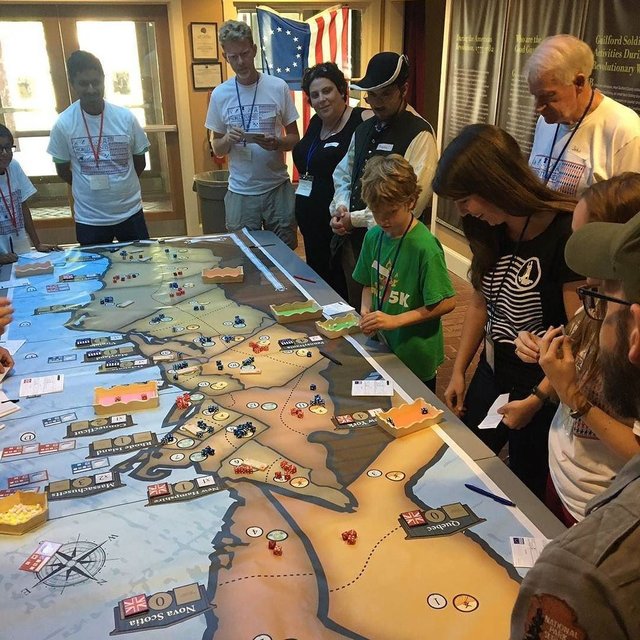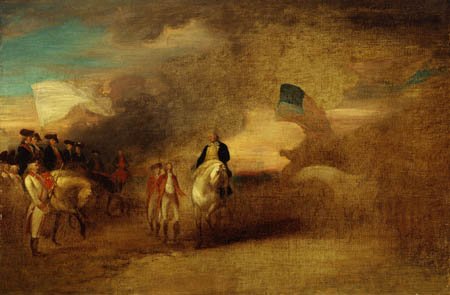review: The World Turned Upside Down [megagame]
Two RedCoats (or Red Lanyards), Me, a spy from NC, George Washington (in the hat), our youngest general, the venerable delegate from SC, and General Lafayette.
[image link on Twitter]
Last Saturday at the GuCo, "site of the largest battle of the Revolutionary War's Southern Campaign," as part of its hundredth year as a national park, The World Turned Upside Down. By that I mean that 38 people showed up to play a free simulation of the Revolutionary War. TWoTUD is what's called a megagame, combining elements of strategy board games and live action role playing (LARPs). They apparently started in Britain, and have spread to the United States. This one was designed by a New York state group called IronMark Games, who came down to run the game and to train the rangers and their local volunteers. The park administrator said that they hope to make these kinds of events as much a regular part of their educational mission as their physical exhibits of Colonial artifacts and their living history events.
Surrender of Cornwallis at Yorktown by John Trumbull, (depiction of 1781 event). [image link]
The Design of the Game
TwoTUD is built to serve a group of 60 people, divided into two 30-person teams, the Thirteen Colonies and the British Empire. One of the most interesting parts of the the design is that there are multiple tracks for the players to take. They issue orders and roll dice on the big map as Generals, or they can be Delegates to the Continental Congress, passing bills that enable different economic or battlefield actions. There's an optional mini-game where Spies try to gain information, steal or sabotage equipment, and plot ambushes. Because we didn't have the full 60 people, my colony, Georgia had only one player (me), which meant I had to bounce back and forth from round to round. There are up to eight 30-minute rounds, each round divided into two 15-minute phases.
In the Colonial phase, we grew wheat to feed the soldiers and gathered money to use in the Action phase. This happened in a different room, grouped into three tables. Georgia, the two Carolinas, and Virginia sat at one table as the Southern Colonies. The Mid-Atlantic colonies were at a second table, and the New England colonies were at a third. We could talk and share resources freely at our own table, but if we wanted to make deals across tables, or to negotiate with the Brits, we had to pass notes. The Spies could meet clandestinely in person.
During the Action phase, the battles happen on the big map at the same time that Congress and Parliament were meeting in two other rooms (for a total of five different rooms; you can see that setting this up was not a trivial undertaking for the park). The battles were essentially like Risk: you roll a pool of dice (d6 for infantry and d8 for artillery), eliminating enemy units on a 5 or better, until all of the units on one side are gone, or there's a surrender – in which case the remaining units are held prisoner (this never happened in our specific game). It was slower than Risk in the sense that we couldn't just move our own pieces, in full view of both sides. We had to write our orders for the next round down and let the helpers move them between rounds (that whole “fog of war” thing). In Congress the game master (called Control) would lay out three possible bills, and the players would decide which ones to enact and how to divide the budget between them. This was not window-dressing. The bills essentially changed the rules of the game as we were playing. For instance, Opening the Ports gave all the colonies bonus food, and Establishing a Continental Army allowed us to share troops a lot more effectively.
Another interesting piece of the design is that players take on the roles of historical individuals from the colonies, and these characters have individual game abilities. If I had read the rules ahead of time, I would have known that, but I didn't and so picked my guy, Lachlan McIntosh from Georgia, purely for his name (“if it's not Scottish, it's CRAP!”). It wasn't until the game started that I thought to look on the back of my name tag for his special abilities. As a General, he could build Forts, which modify the dice rolls to make it harder to kill your own soldiers (pretty good, I thought) – and he could do it during the Colonial phase, after the orders had been issued but before combat started in the next Action round (even better!). As a Spy, he could move units into Forts to reinforce them, again during the Colonial phase in between combats. I never used the Spy ability, because we could only nominate one Spy per round, and one of our North Carolina players (Sarah, above) latched onto the Spy role so enthusiastically that there was no question of trying it out.
All the famous names were there – Washington, Hamilton, Lafayette, Benedict Arnold – along with other people you've never heard of, like my guy Lachlan, and each of them had their own abilities. Washington's was to remove enemy dice from a battle before they could be rolled (because, so they say, Nothing makes an Englishman shit faster than the sight of George Washington.). The organizers seemed to think that was a little broken in practice, and they changed the rules as we were playing to limit his use of that ability. That's the kind of thing that never bothers me, because I'm interested in those nerdy questions of design process, but some personalities get so into the win/lose aspect of the game that they are upset by in-game changes.
We started pretty historically, with the southern colonies firmly in British control. This is, to me, one of the coolest aspects of the game, educationally. Like any scientific simulation, it's possible to vary the initial conditions, play the game repeatedly, and work out realistic cause and effect relationships, rather than just arguing endlessly the way academic historians tend to do (I've written about this pet peeve before in my IGMS column).
Our Specific Instance of TWoTUD
Once I got around to actually looking at his abilities, my guy Lachlan was clearly meant to be on the map fighting. I did visit the Congress once to help pass Establishing the Continental Navy, and to be promoted to Admiral, which meant I could order a whole group of Ships to move, instead of being limited to one at a time. Georgia started with no military units on the board, and with the Brits in control of the colony. I had to spend the first two or three rounds buying soldiers and moving them into the three unoccupied regions of the colony so that I could flip the colony to my control. This gave me more resources, and didn't require me to lose any soliders fighting early on. My special ability allowed me to build two forts in two rounds, so while the Brits still held one of my cities, they seemed happy to stay there and not bother me until I was ready for them. In the later rounds I focused on holding my territory and working on the “Hearts and Minds” campaign, which doubled Georgia's victory point value from 3 to 6.
Virginia moved south into western NC and helped flip it pretty quickly, but South Carolina stayed red the whole game, cutting the south in two and drawing off a lot of resources. Both the SC players chose to be Delegates, and spent the game supplying those of us who were fighting (without which I at least would have lost quickly). George Washington stayed in the southern campaign with me pretty much the whole time, instead of going north to cross the Delaware like he did historically. He kind of had to, because the NC players were Delegating and Spying, respectively, and each General only gets to issue one set of orders each round. We got some help in the middle rounds from some non-player factions, the Tennessee Mountaineers and some infantry from Spanish Florida.
In the North, the British Navy owned the seas. The Empire, in a bold and desperate move, SOLD INDIA to the French, which allowed them to hire a very large number of Hessian mercenaries, who just overwhelmed New York. The Brits held on to everything north of that, as well, but only by occupation. It seemed they been so busy fighting that they had not invested much in the Hearts and Minds campaign, so their colonies were not worth as much as ours in victory points. By the end, the Divided States of America consisted of just 5 or 6 former colonies, but we won firmly on Hearts and Minds victory points, 35 to 10 or something like that.
It was 1781 by then (8pm local time), and everyone was ready to go home. We had been bleeding players since about 1777 (6pm), which slowed things down some. There were only about 20 people out of the original 28. Historically, the colonies were not nearly as good at working together as we were. Benedict Arnold stayed loyal, for instance, as the Commander in Chief of the Continental Army. There's actually a check box at the bottom right of the orders sheet for “betrayal,” which presumably would change the colors of the affected dice and cause the player to switch teams, but as far as I know it never happened during our game. There were some British desertions, I think, but I must have been in Congress that round, so I don't know how that worked.
The Dice Tower vodcast filmed part of a TWoTUD session here:
Conclusion
Overall, it was really fun, and I would play it again. It was especially nice to be playing with a high proportion of history buffs who seemed to be game novices, because it cut down on the metagaming talk about how the rules of this game compare to the rules of every other game out there. The time limits (15 minutes per phase) also meant that we had to stay focused and do things, not just stand around trapped in “analysis paralysis.” I can also imagine an online version for AP US History classes to play against one another. Otherwise, at one 15-minute phase per day, it would take over three class weeks to run single game during school, assuming the students stayed interested for that long. Or maybe it could be a Saturday snow day make up session (good luck with that!).
It would be an interesting challenge to design other historical educational megagames. Maybe a Civil Rights campaign, for instance, which would have less emphasis on the military aspect and more on the media.


Oh, damn! I missed this post by one day @ploybot2015! Definitely come back to Steemit. I miss you!
Thanks, man. I've been writing grant applications, but that should be done for the holidays.
You on Discord @plotbot2015? Come find me. I'd like to stay in touch. "kommienezuspadt
#6545"
My kid uses Discord, but I never have. Maybe I'll get him to show me.